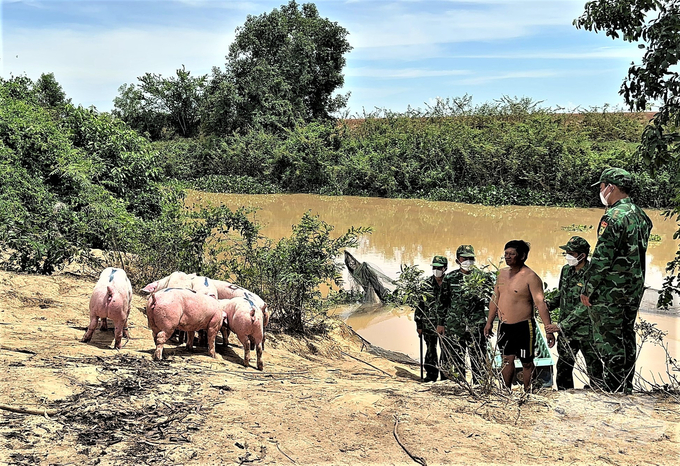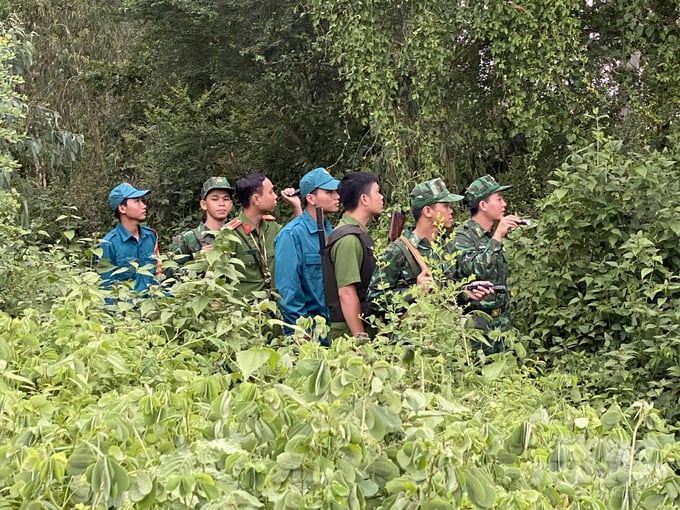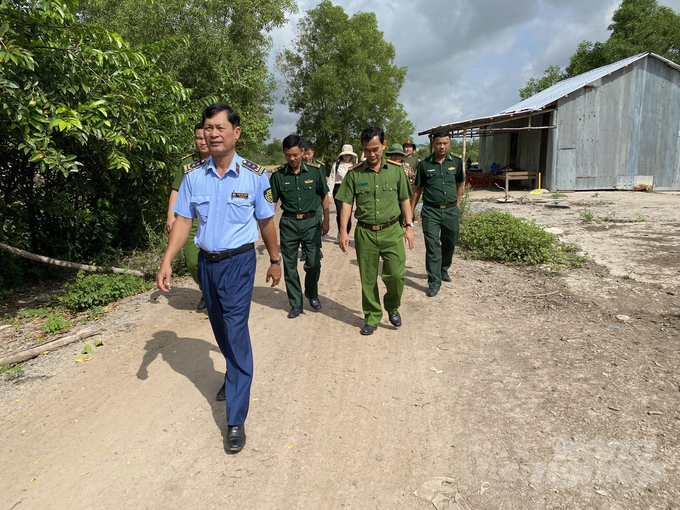May 30, 2025 | 22:05 GMT +7
May 30, 2025 | 22:05 GMT +7
Hotline: 0913.378.918
May 30, 2025 | 22:05 GMT +7
Hotline: 0913.378.918

A person who smuggled pigs across the border was discovered and arrested by the Song Trang border post. Photo: Hoang Vu.
One early afternoon in August, we journeyed hundreds of kilometers along rural roads to reach the border area adjacent to our neighboring country, Cambodia. The Cai Co River marks the boundary between the two nations, and during this season, its changing color to muddy brown signals the onset of the flood season. This is also when smuggling activities across the border intensify significantly. Border protection forces must be vigilant in countering illicit trade infiltrations and preventing them from entering the interior.
Vietnam shares a 1,137-kilometer land border with Cambodia, with Long An province situated in the Mekong Delta region having the longest border stretch, spanning over 133 kilometers. The Song Trang Border Guard Station, responsible for safeguarding a 15.8-kilometer border section (located in Hung Ha commune, Tan Hung district, Long An), plays a pivotal role in these efforts.
As twilight gradually descended, we followed the patrol team of the Bung Tram Border Control Station (under the Song Trang Border Guard Station), led by Captain Mai Hoan Hao. Witnessing their on-site operations underscored the immense challenges faced by border guards. After a stretch of motorbike travel, the team came to a halt, transitioning to patrolling on foot.
Uncovering instances of smuggling across the border is far from straightforward, especially under the cover of darkness. Our comrades navigate through thickets of trees intermingled with tall grass, remaining vigilant to avoid detection. While carrying handheld flashlights, they dare not illuminate them to prevent revealing their positions. After their trek, they assume concealed positions at key spots. The moment any suspicious activity is detected, the smugglers quickly cross the Cai Co River and retreat onto foreign soil, evading the pursuing border guards.
During a brief rest in an abandoned shack belonging to local residents, Captain Mai Hoan Hao shared that typically, the station conducts patrols at least four times a day according to the plan. However, in the face of increased smuggling activities, they intensify efforts, regardless of day or night, rain or wind, in order to maintain effective border control.
Discussing the tactics employed by smuggling groups, Lieutenant Colonel Nguyen Tien Nam, Deputy Head of Operations at the Song Trang Border Guard Station, revealed that due to the geographical alignment of the border along the river, smugglers take advantage of the cover of night and inclement weather to surreptitiously transport illicit livestock across the border into Vietnam.
Particularly noteworthy is the presence of livestock pens belonging to local residents situated right in front of or adjacent to the border. Smugglers often divide their cargo into small groups of 2 to 5 pigs per load, transporting them across the border and integrating them with the livestock of Vietnamese households for a semblance of legitimacy.
During the first six months of the year, the Song Trang Border Guard Station conducted patrols, covert operations, and apprehended 12 smuggling cases involving 13 suspects. Seized items included tobacco, sand, cosmetics, and general merchandise. Moreover, two cases involving the transportation of illicit pigs (a total of 22) and one case involving smuggled cattle (a total of 15) were apprehended. Following the seizures, the border guard station collaborated with relevant authorities to dispose of the confiscated items in accordance with the current regulations of the Ministry of Agriculture and Rural Development.
Major Nguyen Van Hoi, Head of the Song Trang Border Guard Station, remarked that due to the unique nature of the border terrain, which combines both land and river elements, including a myriad of trails and open waterways, the Cai Co River runs parallel to the border and features narrow segments of less than 10 meters wide. These circumstances are exploited by smuggling groups, particularly during complex terrain and nocturnal conditions, to transport goods and living creatures into Vietnam. They take advantage of price differentials to benefit from illicit activities.
"During the flood season, smuggling activities intensify significantly. To address this, we focus on deploying additional resources such as motorized boats, life jackets, and flashlights to bolster our patrolling and monitoring efforts along river routes and waterways. Our goal is to detect, combat, and prevent unauthorized border crossings and smuggling activities across the border", emphasized Major Nguyen Van Hoi.

It is no simple task to detect a pig smuggling case across the border, especially in the dark, border guards had to be in secret uniform, wriggling in the orchards along the riverbank, mixed with tall grass and reeds. Photo: Hoang Vu.
In the face of the escalating trend of pig smuggling, Prime Minister Pham Minh Chinh urgently issued a directive calling on provinces, cities, ministries, and agencies to implement measures to prevent, detect, and strictly handle cases of illegal buying, transporting, and smuggling of pigs across the border into Vietnam. Cases of discovering illegally imported pigs must result in immediate re-exportation or disposal, along with the processing of organizations and individuals involved in violation.
Following the Prime Minister's directive, the province of Long An has established a task force to conduct on-site inspections of the smuggling situation along the border. Mr. Pham Duc Chinh, Deputy Head of the Standing Committee of the National Steering Committee against Smuggling, Counterfeit Goods and Trade Fraud (National Steering Committee 389), and Director of the Provincial Market Management Department, stated that the provincial People's Committee has directed departments, agencies, National Steering Committee 389 at local levels, border checkpoints, and border control stations to enhance border management and combat smuggling and trade fraud.
Based on on-site border inspections and reports from border districts, the border forces of Long An province are currently maintaining effective control over the border. Smuggling cases have been minor in nature, and many have been discovered, apprehended, and dealt with according to regulations.
According to Mr. Pham Duc Chinh, following the inspection period, the National Steering Committee 389 will provide a report to the provincial People's Committee. This will enable functional departments, the Department of Agriculture and Rural Development, veterinary forces, and statistics agencies to reassess all herds of livestock and poultry being raised in the border area. Through this, timely detection of fluctuations and increases in numbers can occur, as a result of collusion and legitimizing the origin of transported and smuggled pigs. Concurrently, public awareness campaigns will be conducted, urging citizens to commit to not engaging in smuggling or aiding in the legitimization of smuggled pigs into the Vietnamese border.
According to the Ministry of Agriculture and Rural Development, the smuggling and illicit transportation of pigs across the border increases the risk of the spread of dangerous diseases such as African swine fever and foot-and-mouth disease. This is not only a violation of the law but also harms the domestic livestock industry and the health of consumers.
As illegally imported pigs lack a clear origin, they may be fed prohibited products, fail to meet veterinary hygiene requirements, and lack food safety assurances, posing a serious threat to the domestic livestock industry and public health.
Consequently, immediate action is required to put an end to the illegal import, transportation, and trading of animals and animal products, particularly pigs and pig-related products, along open routes and passages along the southwestern border.

Mr. Pham Duc Chinh, Standing Deputy Head of the Nationa Steering Committee 389, Director of Long An Market Management Department, led the inter-sectoral delegation of Long An province to inspect border smuggling and trade fraud activities. Photo: Hoang Vu.
Cases of illegal pig trading, upon discovery and apprehension, must be rigorously processed and disposed of according to regulations. Functional agencies and citizens need to enhance their awareness and cooperation to prevent, deter, and strictly handle cases of illegal buying, transporting, and smuggling of pigs across the border. This is one of the essential tasks to safeguard the domestic livestock industry and public health.
The situation of pig smuggling across the border in Long An province mainly arises in the border area of Hung Dien commune, Tan Hung district. The quantity of smuggled pigs is relatively small and irregular.
The methods and tactics of these activities involve taking advantage of the cover of night, favorable terrain, narrow stretches of the Cai Co River that can be crossed by any small watercraft, exploiting unpopulated areas for crossing, connecting with Cambodia, and hiring local border residents. Smuggled pigs are divided into groups of 3 to 5 and transported across the border river to collection points. The smuggled pigs are then documented as domestic pigs on paper. Subsequently, they are quickly transported using vehicles for domestic consumption. Throughout the transportation process, strict organizational control is maintained to avoid detection and capture.
Ever since the beginning of 2023, the Border Guard and Police forces of Long An province have discovered and apprehended 5 cases of smuggling involving cattle and pigs. A total of 68 pigs and 26 cattle were confiscated and subsequently destroyed. The relevant authorities have initiated legal proceedings against 3 suspects and imposed administrative fines on 4 individuals, amounting to 27 million VND.
Translated by Nguyen Hai Long

(VAN) Vaccinating juvenile pangasius helps reduce disease, antibiotic use, and farming costs, increasing profits for export-oriented farmers in An Giang.

(VAN) Due to a limited supply of workforce and competitive recruitment requirements, businesses struggle to retain talented veterinary human resources.

(VAN) WOAH’s guidance aims to mitigate disease risks through a One Health approach that balances economic, conservation, and public health interests.

(VAN) Ms. Nguyen Thi Dung, Deputy Director of Ngoc Hoang Cooperative, shared about the journey of bringing dragon fruit to Europe, achieving annual revenues in the billions of VND.

(VAN) Bamboo products from Thang Tho Bamboo Cooperative have reached many countries around the world, while also creating jobs for local workers.

(VAN) The Management Board of Con Dao National Park reported that a green sea turtle, tagged in the Philippines, has traveled thousands of kilometers to lay 84 eggs on Bay Canh Islet.

(VAN) Green technology is paving a new path for sustainable aquaculture in the Mekong Delta in particular and across the country in general, helping reduce emissions and adapt to climate change.